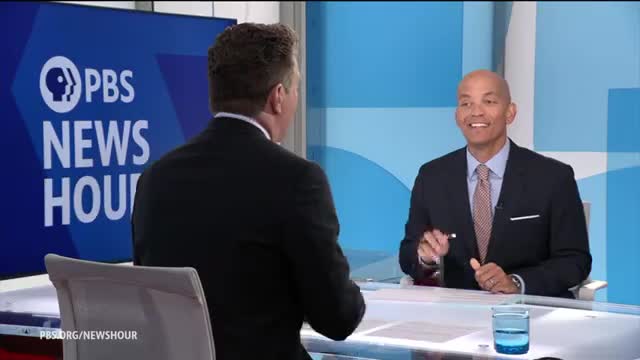Wildland firefighter confronts climate change's fierce impact
This article was created by AI summarizing key points discussed. AI makes mistakes, so for full details and context, please refer to the video of the full meeting. Please report any errors so we can fix them. Report an error »

In a recent government meeting, discussions centered on the contrasting climate change policies of potential presidential candidates, Vice President Kamala Harris and former President Donald Trump. Harris, emerging from an administration that enacted significant climate legislation, has yet to articulate a clear policy direction for her potential administration. Critics point out a contradiction in her approach, as she promotes green energy initiatives while simultaneously boasting about the U.S.'s record oil and gas production. This dual focus raises questions about how her administration would reconcile these competing priorities.
On the other hand, Trump has dismissed climate change as a non-issue, proposing to cut energy prices significantly while advocating for increased oil and gas drilling. His administration's potential rollback of environmental regulations, as outlined in the Heritage Foundation's Project 2025, could lead to a comprehensive dismantling of federal climate initiatives. However, the feasibility of such drastic changes remains uncertain, especially given the bipartisan support for climate-related funding in Republican districts, which could complicate efforts to eliminate these programs.
As the debate over climate change intensifies in the lead-up to the election, the real-world implications of these policies are becoming increasingly evident. Sarah Jacober, a wildland firefighter with the U.S. Forest Service, shared her experiences battling wildfires exacerbated by climate change. She highlighted the growing challenges firefighters face as wildfire seasons lengthen and fires become more difficult to control. Jacober's insights underscore the urgent need for effective climate policies, as the realities of climate change directly impact those on the front lines of environmental crises.
The meeting reflects a critical moment in the ongoing dialogue about climate change, revealing stark differences in policy approaches and the potential consequences for both the environment and those tasked with managing its challenges.
On the other hand, Trump has dismissed climate change as a non-issue, proposing to cut energy prices significantly while advocating for increased oil and gas drilling. His administration's potential rollback of environmental regulations, as outlined in the Heritage Foundation's Project 2025, could lead to a comprehensive dismantling of federal climate initiatives. However, the feasibility of such drastic changes remains uncertain, especially given the bipartisan support for climate-related funding in Republican districts, which could complicate efforts to eliminate these programs.
As the debate over climate change intensifies in the lead-up to the election, the real-world implications of these policies are becoming increasingly evident. Sarah Jacober, a wildland firefighter with the U.S. Forest Service, shared her experiences battling wildfires exacerbated by climate change. She highlighted the growing challenges firefighters face as wildfire seasons lengthen and fires become more difficult to control. Jacober's insights underscore the urgent need for effective climate policies, as the realities of climate change directly impact those on the front lines of environmental crises.
The meeting reflects a critical moment in the ongoing dialogue about climate change, revealing stark differences in policy approaches and the potential consequences for both the environment and those tasked with managing its challenges.
View full meeting
This article is based on a recent meeting—watch the full video and explore the complete transcript for deeper insights into the discussion.
View full meeting